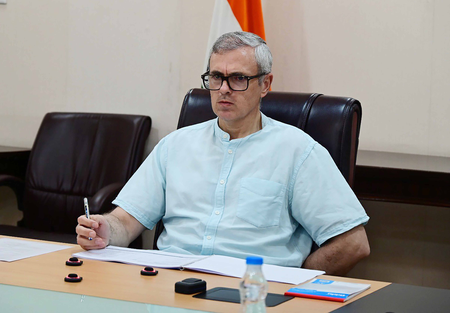Srinagar: Jammu and Kashmir (J&K) cabinet headed by Chief Minister Omar Abdullah is meeting on Wednesday evening to discuss the cabinet sub-committee (CSC) report on reservations in government jobs.
The CSC finalised its report on June 10, and the same will be tabled before the cabinet to take its call on the contentious issue that has constitutional and legal implications.
The report finalised on June 10 by the CSC will be discussed, and a view will be taken on how to proceed on the sensitive issue.
Of the five cabinet ministers in J&K, except the CM, three ministers are members of the CSC.
There has been unrest among the open merit candidates as the reservations under various categories in the UT have reached almost 70 per cent, leaving just 30 per cent of seats for the open merit candidates to compete among themselves when applying for a government job.
The cabinet will have to take the final call on the implementation of the CSC report and also the procedure to be adopted to implement the CSC recommendations.
The ruling National Conference (NC) election manifesto had promised to revisit the reservation policy to make it merit-friendly by providing open merit candidates the maximum share.
On December 10, 2024, the CSC was formed and asked to submit its report within six months.
For the Omar Abdullah-led government, taking the final call on reservations is going to be a tough call, as a cut in the reservation in any category will be a difficult task, but without that, there is no other way to give relief to open merit candidates.
As per the existing rules, 20 per cent reservation has been given to Scheduled Tribes (STs) including 10 per cent each to Gujjars and Bakerwals and Pahari Ethnic Tribes, 10 per cent to Resident of Backward Areas (RBAs), 10 per cent to Economically Weaker Sections, 8 per cent to Other Backward Classes, 8 per cent to Scheduled Castes (SCs) and 4 per cent to the residents of areas adjoining Line of Actual Control (ALC)/International Border (IB).
There is a 10 per cent horizontal reservation, including 6 per cent to ex-servicemen and 4 per cent to Persons with Disabilities (PwDs).
Further, some candidates from the reserved category, who get selected in the general category, can also opt for jobs in the open category.
There was no reservation for OBCs till a year back, and only four per cent reservation was given under the category Other Social Castes (OSCs). The BJP-led Union government fulfilled the long-pending demand of the OBCs for reservation and passed a law in the Parliament, after which they got 8 per cent reservation.
Also, there was a 20 per cent reservation under the RBA category, which has been reduced to 10 per cent. There were allegations that influential persons got their villages included in the RBA category to avail the benefits of reservation for their kin.
The reservations in Jammu and Kashmir came into effect after the Reorganisation Act 2019 was passed by the Parliament. Even if the CSC recommendations are accepted by the cabinet and also passed by the UT’s Legislative Assembly, the question being asked is whether they can come into effect without the Parliament’s approval?
Jammu and Kashmir Reorganisation Act, 2019 includes provisions for reservations in jobs and admissions within the Union Territories of Jammu and Kashmir and Ladakh. These provisions extend the existing reservation policies applicable to Scheduled Castes, Scheduled Tribes, and other socially and educationally backward classes to J&K.
